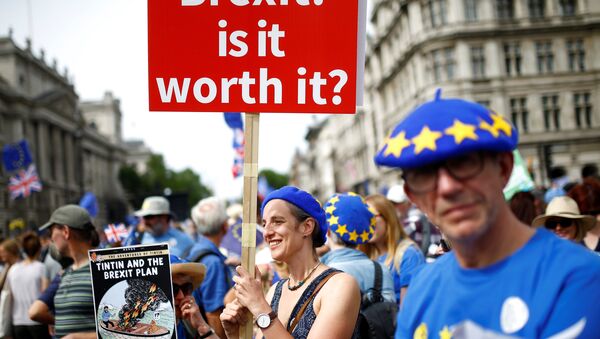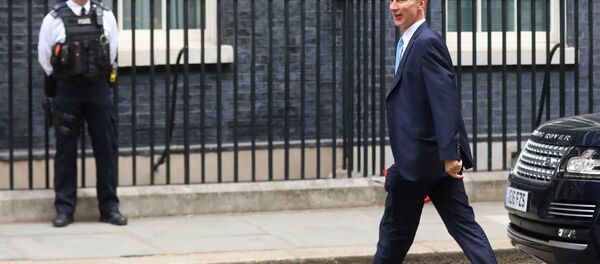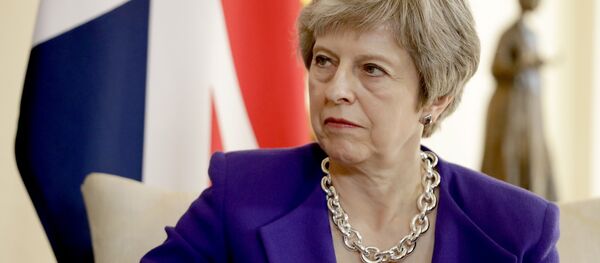May has called for the pace of negotiations to be stepped up, saying “we both know the clock is ticking, let's get on with it.” The news comes as the UK’s new Brexit secretary said that Britain will refuse to pay its 39-billion pound divorce bill if the EU fails to agree on a new trade deal.
Radio Sputnik has discussed the latest statements on Brexit by UK officials with Donnacha Ó Beacháin, associate professor at the School of Law and Government, Dublin City University.
READ MORE: 'Very Mythical': Netizens Ridicule Brexit White Paper Translation Fiasco
Sputnik: What’s your take on the statement made by the new Brexit Secretary? Can Britain actually avoid paying for the divorce bill?
Donnacha Ó Beacháin: Well, it was a very surprising statement because the EU has been from the beginning quite clear on the order, the time frame during which things will take place and it clearly said that and the UK agreed to this. It’s committed already, it’s an obligation, that it will sort out the so-called divorce bill, the rights of EU citizens living in the United Kingdom and the Irish border. These matters will be sorted out as part of a withdrawal agreement and only then, once a withdrawal has taken effect and the UK is effectively a third country, then a trade agreement will be negotiated. And that will take many years, indeed, to negotiate a detailed trade agreement as recent experience with other parts of the world has demonstrated. So it’s putting the cart before the horse. It’s something that actually can’t be done. And it’s what happens when you have ministers who are speaking to a domestic audience and not to an international audience or not being aware that an international audience is also listening.
Sputnik: I suppose his statement further adds to the mire and the confusion that’s currently surrounding the whole Brexit scenario at the moment. Perhaps he’s trying to stamp his own authority onto the role that he’s just been placed into, whether that’s going to help or not, probably not. So, what consequences can this have on the negotiations with the bloc? Obviously, the EU feel that they’ve got the strength of power at the moment, do you think it’s going to further exacerbate what we thought was now going to move forward in terms of the negotiations only going to slow things down you would have thought?
Donnacha Ó Beacháin: I think it will slow things down. Theresa May as your introduction stated has said the clock is ticking and everybody’s aware of that. But the point is that the White Paper is a starting point. It’s not the end point in the negotiations and, indeed, the European Commission has already dismissed its main contents as unworkable, because essentially the EU has been long established and indeed the UK has been a member for over four decades. So it knows all about the EU. And therefore the European Union is not going to destroy or undermine its basic principles to facilitate Brexit. Brexit at the end of the day was a British decision; it’s not a European Union one. And whereas it’s obvious and natural that the United Kingdom will try and preserve its own national interests in negotiations; it’s also equally natural that the European Union will try and preserve its interests. And as has been said many times there are consequences, well-known consequences, for leaving the single market and the customs union. These are not means to punish Britain in any way, these are simply the consequences of a democratic decision and the EU, with or without UK participation, will remain the European Union. I think what’s perhaps more interesting is that, will the United Kingdom remain the United Kingdom post-Brexit? As you’re aware of course there has been a lot of discussion in Scotland and in Northern Ireland, where Theresa May was during the weekend, about their future in the UK post-Brexit. I think that in itself is something that will be on the agenda in the coming years.
READ MORE: Amazon's UK Head Warns of 'Civil Unrest' in the Event of No-Deal Brexit
Sputnik: The announcement is likely to be welcomed by leading Brexiteers within the Party, what do you think the impact will be on an already divided Conservative Cabinet? We know that the Cabinet is primarily now left with Remainers, so it’s only going to further exacerbate the situation. There’s been a couple of amendments by Theresa May to this White Paper. There’s still a very much a state of flux with it all, isn’t there?
The views expressed in this article are solely those of the speaker and do not necessarily reflect Sputnik’s official position.



